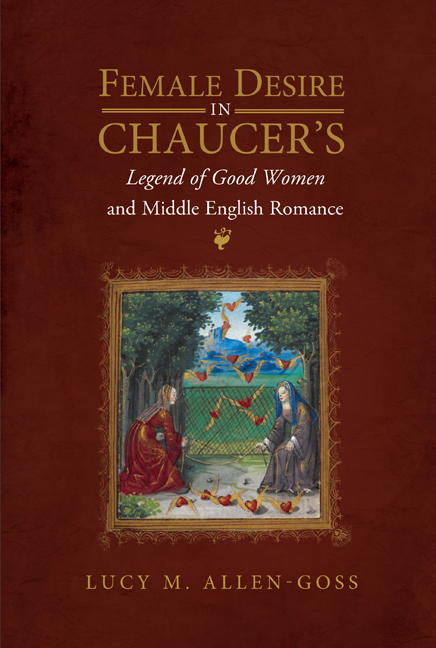Book contents
- Frontmatter
- Contents
- Acknowledgements
- Abbreviations
- Author’s Note
- Introduction: The Origins of Female Desire
- 1 The Silencing of Female Desire in the ‘Legend of Philomela’
- 2 The Traumatised Narrative of the Alliterative Morte Arthure
- 3 ‘As Matter Appetiteth Form’: Desire and Reciprocation in the ‘Legend of Hipsiphyle and Medea’
- 4 Stony Femininity and the Limits of Desire in The Sowdone of Babylon
- 5 Veiled Interpretations and Architectures of Desire in the ‘Legend of Thisbe’ and the ‘Legend of Ariadne’
- 6 Opening Mechanisms, Enclosing Desire: The Erotic Aesthetics of Undo Your Door
- Conclusion: The Ends of Desire
- Bibliography
- Index
- GENDER IN THE MIDDLE AGES
4 - Stony Femininity and the Limits of Desire in The Sowdone of Babylon
Published online by Cambridge University Press: 16 September 2020
- Frontmatter
- Contents
- Acknowledgements
- Abbreviations
- Author’s Note
- Introduction: The Origins of Female Desire
- 1 The Silencing of Female Desire in the ‘Legend of Philomela’
- 2 The Traumatised Narrative of the Alliterative Morte Arthure
- 3 ‘As Matter Appetiteth Form’: Desire and Reciprocation in the ‘Legend of Hipsiphyle and Medea’
- 4 Stony Femininity and the Limits of Desire in The Sowdone of Babylon
- 5 Veiled Interpretations and Architectures of Desire in the ‘Legend of Thisbe’ and the ‘Legend of Ariadne’
- 6 Opening Mechanisms, Enclosing Desire: The Erotic Aesthetics of Undo Your Door
- Conclusion: The Ends of Desire
- Bibliography
- Index
- GENDER IN THE MIDDLE AGES
Summary
The early fifteenth-century Sowdone of Babylon has its roots in a twelfth-century chanson de geste. This chanson blends romance with chivalric violence and nationalistic piety, describing how Charlemagne's knights reclaimed the stolen relics of Christ's crucifixion for the nascent empire of France. Its heroine is the Muslim princess Floripas. Flooded with fiery passion and weeping emotion, she exemplifies the belle sarrasin trope so beloved of French chanson de geste and English romance: the beautiful Muslim woman whose aberrant femininity delimits the boundaries of ideal Christian womanhood, and who is ultimately contained within the structure of Christian marriage. Yet in The Sowdone of Babylon, all certainties are called into question. To anyone familiar with the chanson or the subsequent Anglo-Norman and Middle English versions of the text, the Sowdone of Babylon's most striking quality is what it does not contain. The profuse language of sensuality, which washes through the counterpart texts to infuse both the female protagonist and the religious relics with an almost interchangeable desirability, is nowhere to be found. Desire in the Sowdone is puzzlingly difficult to locate. In this respect, the text stages one of the central questions of this book. Women who do not desire men baffle both medieval and modern categories. How can female desires and emotions defined by resistance to erotic or emotional contact with men be understood, not merely as negative or lacking states, but also as autonomous expressions of sexuality? Related to this enquiry, and often pressed into service in the attempt to pin down these elusive, negatively defined sexualities, is the question of how femininity relates to female sexuality, and how aberrations in gender reflect, predict, coexist with or qualify alternative sexualities. The conversation is not confined to the medieval period, and can be found submerged in some very recent ecofeminist and queer theory. This chapter probes the implications of that seldom-acknowledged relationship between medieval and contemporary, yoking together medieval medical and philosophical theories of female fertility with late medieval anxieties about the pregnant body and the pregnant potential of the relic, to shed light on more recent theories of female, queer and posthuman embodiment. In this chapter, I explore the cultural discourses that inform the Sowdone of Babylon and its tradition, and I argue that the Sowdone's rejection and reconfiguration of those discourses might offer a model for transforming contemporary theorisations of gender and desire.
- Type
- Chapter
- Information
- Publisher: Boydell & BrewerPrint publication year: 2020



